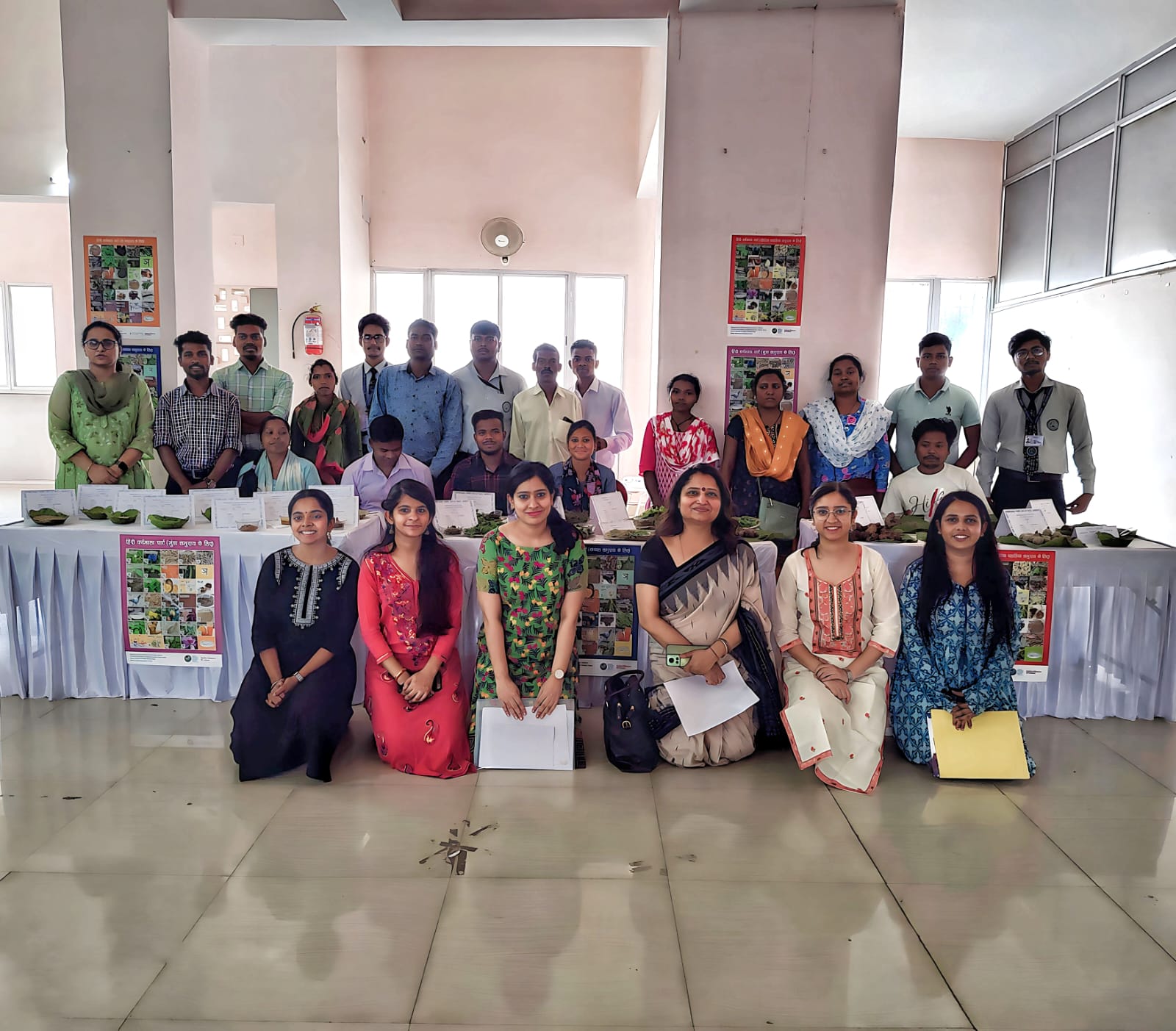
Study done by the Nutrition team at the George Institute India as part of the intermediate fellowship of Suparna Ghosh-Jerath, under the DBT Wellcome trust India Alliance
This research highlights India’s program “International Year of Millets 2023” to encourage production and consumption of nutritious millets
Link to Research Papers – https://we.tl/t-PoNpPDTYBV
New Delhi, 28th April 2023: Nutrition Researchers at The George Institute for Global Health India, disseminated the findings of a comprehensive research study that assessed the indigenous food systems of vulnerable tribal communities Jharkhand, India and their contribution towards the food security and nutritional status of these communities. Four tribal communities were assessed: Santhal, Munda, Ho, and Sauria Paharia, and the observations and inferences have been presented in numerous research papers and conferences. On 24th April 2023, a dissemination seminar was held at the Dr. Shyama Prasad Mukherjee University, Ranchi, to share the study findings with the university students, and stakeholders like the NGOs working in health and nutrition, International Development organizations, academia amongst others.
The research had three main objectives. The first objective was to characterize the food environment of the four tribal communities, assess availability, access, and utilization of indigenous foods (IFs) by these communities, assess perceptions of the communities regarding the indigenous foods and examine barriers and facilitators to increase sustainable production, procurement, and their consumption. The second objective was to assess the nutritive value of IFs that are routinely accessed, and the third objective was to estimate the contribution of indigenous foods to nutrient intake and nutritional status of the communities.
The study found that while the tribal communities had traditional ecological knowledge about a variety of indigenous foods, the consumption of these foods among, women and children in all communities was inadequate with poor nutrient intake. Vitamin A and iron deficiency was observed among women of the Sauria Paharia and Santhal communities. Among the Munda women, there was poor intake of all nutrients except protein and vitamin C, while the Ho community had inadequate intake of all nutrients except for Vitamin A, Vitamin C, thiamin, and niacin. A high prevalence of wasting, stunting, and low weight was observed in young children in all the tribes. It is possible to tackle undernutrition in these communities by implementing strategies such as agricultural extension programs that promote indigenous crop varieties and nutrition education sessions to increase dietary diversity using indigenous foods.
Qualitative discussions revealed that climate variability had a significant impact on the agroforestry systems, with reduced crop productivity, diversity and food availability from forests and waterbodies resulting in reduced consumption of indigenous foods. The easy availability of cheap ultra-processed foods in local markets was seen to create a shift in dietary patterns, and promotion of hybrid seeds by local agricultural organizations led to reduced production of indigenous varieties.
The research also analysed the value chains of finger millet and Koinaar leaves among some of the Indigenous communities. The study identified postharvest losses, laborious processes, and weather dependence as barriers towards production and consumption of finger millet, while limited seasonal availability and lack of preservation techniques were associated with reduced production and processing of Koinaar leaves. Improving storage, processing machinery, preservation techniques, and market opportunities could enhance production and consumption of these nutrient-rich indigenous foods. This research has significance to India’s program “International Year of Millets 2023” to encourage production and consumption of nutritious millets.
The COVID-19 pandemic further jeopardized food security globally, with heightened threats for the most vulnerable, including smallholder farmers and rural indigenous populations. The study conducted a serial cross-sectional study to document the effect of the pandemic on the food environment, agricultural practices, diets, and food security among vulnerable smallholder farmer households in indigenous communities of Santhal, Munda, and Sauria Paharia. The pandemic significantly impacted food security, agricultural practices, and the availability and accessibility of indigenous foods. Lockdowns and supply chain disruptions resulted in decreased food availability, reduced access to markets and rise in food prices, and changes in food consumption patterns. However, the study also identified potential resilience factors, against the impact of COVID-19 pandemic on indigenous food systems such as accessibility to agricultural inputs like indigenous seeds, availability of family labour due to back migration and access to diverse food sources.
The team of researchers from George Institute recommend that in addition to increasing the demand for locally produced foods, it is important to promote the creation of community seed banks for distributing indigenous seeds, educating indigenous communities on sustainable farming methods to preserve local landraces and drought-resistant varieties, and supporting communities in establishing home gardens. Nutrition education sessions that reinforce traditional ecological knowledge and raise awareness about the nutritional significance of indigenous foods should also be encouraged. These actions are essential for promoting resilient, nutritious, and sustainable food systems.
ABOUT The George Institute for Global Health
The George Institute for Global Health is an independent medical research institute aiming to improve the health of millions of people worldwide by generating effective, evidence-based and affordable solutions to the world’s biggest health challenges. Established in Sydney, with major centres in China, India and the UK, it has projects in more than 45 countries and affiliations with world-class universities. In 2018, The George Institute was ranked the number-one independent research institute in Australia by Times Higher Education.
Please follow The George Institute for Global Health on: Twitter / LinkedIN
MEDIA CONTACT FOR The George Institute of Global Health
Bhavani Giddu – Footprint Global Communications
Cell: 9999500262 / Email: [email protected]







I just like the helpful information you provide in your articles
Pretty! This has been a really wonderful post. Many thanks for providing these details.
Pretty! This has been a really wonderful post. Many thanks for providing these details.